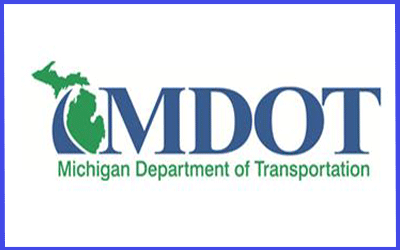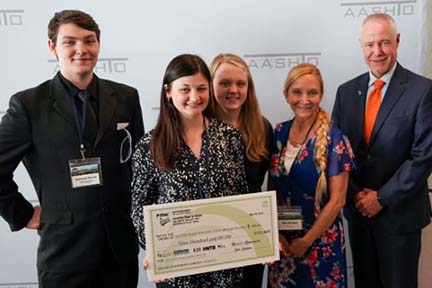FOR IMMEDIATE RELEASE
May 25, 2023
|
|
MEDIA CONTACT
See regional contact
information below. |
MDOT lifts traffic restrictions to ease
Memorial Day travel
Safety benefits:
– MDOT is suspending work and lifting traffic restrictions wherever possible this holiday weekend to ease congestion and increase safety (81 out of 146 projects).
– AAA Michigan estimates more than 1.2 million Michigan residents are expected to travel 50 miles or more from home during the Memorial Day holiday weekend, a 9 percent increase from last year.
– Although some equipment and traffic configurations will remain over the weekend, suspending construction operations improves safety for workers and motorists.
– Remember to buckle up, stay alert and avoid distractions at all times when driving.
LANSING, Mich. – This Memorial Day weekend, the Michigan Department of Transportation (MDOT) is removing lane restrictions on more than 55 percent of its road and bridge projects statewide to ease traffic delays for holiday travelers. AAA Michigan estimates more than 1.2 million Michigan residents are expected to travel 50 miles or more from home during the Memorial Day holiday weekend, a 9 percent increase from last year.
Beginning at 3 p.m. Friday, May 26, and continuing until 6 a.m. Tuesday, May 30, 81 out of 146 projects statewide will have lane restrictions removed. While motorists will see suspended operations in most MDOT work zones for the weekend, drivers are advised that equipment and certain traffic configurations may remain in place, like temporary shifts or shoulder closures.
“With holiday traffic expected to be back to nearly pre-pandemic levels, this is a great time to remind drivers of safe habits as everyone takes to the road this summer,” said Acting State Transportation Director Brad Wieferich. “Don’t forget there is still a record amount of road and bridge work happening out there thanks to Gov. Gretchen Whitmer’s Rebuilding Michigan program, which means you’ll probably be driving through a few of these work zones. We remind all drivers to slow down, stay alert and avoid distractions. You depend on us to fix the roads; road workers are depending on you with their lives. Let’s make sure everyone makes it home each and every night.”
MDOT oversees I, M, and US routes and is responsible for nearly 10,000 miles of state highways, which carry more than 50 percent of all traffic and approximately 70 percent of commercial traffic in Michigan.
The following is a list of work zones that will remain active or have lane restrictions during Memorial Day weekend. If necessary, detour routes will be posted at the project location. All closures are subject to change. For the most up-to-date information on MDOT projects, go to the Mi Drive website at www.Michigan.gov/Drive.
Upper Peninsula
– I-75 in St. Ignace, Mackinac County, has one lane open in each direction using the outside lanes.
– I-75, Chippewa County, will have one northbound lane open over the Pine River.
– M-26, Keweenaw County, is closed at the Silver River west of Brockway Mountain Drive. Detour via US-41.
– M-69 in Crystal Falls, Iron County, is closed at the Paint River bridge. Detour via North 6th Street, Fairbanks Drive and Wagner Street.
– M-123 north of Newberry, Luce County, has one lane open in alternating directions via temporary signals.
– US-2 in St. Ignace, Mackinac County, has the south side of the overpass over I-75 closed. One lane is open in each direction using the north half of the bridge.
– US-41 in Houghton, Houghton County, has one eastbound lane closed at Franklin Square.
– US-41, Houghton County, has one lane open in alternating directions at Massie Road north of Chassell via temporary signals.
– US-45, Ontonagon County, has one lane open in alternating directions over the East Branch of the Ontonagon River via temporary signals south of Rockland.
– US-141, Iron County, has one lane open in alternating directions over the Net River via temporary signals.
For more information, contact MDOT Superior Region Communications Representative Dan Weingarten at 906-250-4809. Follow the Superior Region on Twitter at www.twitter.com/MDOT_UP.
Northern Lower Peninsula
– I-75, Cheboygan County, will have northbound traffic shifted to southbound I-75 with a movable barrier wall.
– I-75 Business Loop (BL), Roscommon/Crawford county line, will have one lane of alternating traffic with a temporary traffic signal.
– M-119 in Harbor Springs, Emmet County, will have one lane of alternating traffic with a temporary traffic signal.
– US-23, Alcona County, is closed from Black River Road to F-41 with a detour on local roads.
– US-31 in Alanson, Emmet County, will have southbound traffic detoured on Milton Road.
For more information, contact MDOT North Region Communications Representative James Lake at 906-250-0993. Follow the North Region on Twitter at www.twitter.com/MDOT_Traverse.
West Michigan
– I-96 in Grand Rapids, Kent County, will have one lane open in each direction between Cascade Road and M-11 (28th Street). Lane closures are in effect on the ramps from M-11 to westbound I-96.
– I-196, Ottawa County, will have one eastbound lane and two westbound lanes open between Zeeland and Hudsonville.
– I-196 Business Route (BR) (Byron Road) in Zeeland, Ottawa County, is closed at the I-196 interchange. The westbound I-196 ramp to westbound I-196 BR is open while all other ramps at the interchange are closed.
For more information, contact MDOT Grand Region Communications Representative John Richard at 616-262-1565. Follow the Grand Region on Twitter at www.twitter.com/MDOT_West.
Southwest Michigan
– I-69, Eaton and Calhoun counties, will have the following restrictions:
– One lane open in each direction between I-94 and Stine Road.
– The southbound I-69 ramp to M-78 is closed.
– The northbound I-69 ramp to eastbound I-94 closed and detoured.
– The Ainger Road ramp to southbound I-69 is closed and detoured.
– I-94, Calhoun County, has two lanes open in each direction between Helmer Road and M-96 (Michigan Avenue).
– I-94, Kalamazoo County, has the westbound ramp to Portage Road closed. Portage Road has one lane open in each direction.
– US-12, Branch County, has single-lane closures in place with traffic shifts from Willow Lane to West Old Chicago Street in Coldwater, and one lane open over the Coldwater River with a temporary signal.
– US-31, Berrien County, has one lane open in each direction between US-12 and M-139.
– US-131, Kalamazoo and St. Joseph counties, has one lane open in each direction between Schoolcraft and Three Rivers.
For more information, contact MDOT Southwest Region Communications Representative Nick Schirripa at 269-208-7829. Follow the Southwest Region on Twitter at www.twitter.com/MDOT_Southwest.
Central Michigan and Thumb
– I-69, Lapeer County, will have one lane open in each direction from M-24 to Lake George Road with a traffic shift. The eastbound I-69 ramps at M-24, Wilder Road, and Lake Pleasant Road are closed.
– I-69, St. Clair County, has lane closures and traffic shifts in place from M-19 to Taylor Road. The westbound ramps at Wales Center Road and Taylor Road are detoured.
– I-69 Business Loop (BL) in Port Huron, St. Clair County, will have westbound lanes closed from 24th Street to I-94 BL; detoured via I-94 BL, Lapeer Street, and 24th Street.
– M-15 in Davison, Genesee County, will have shoulder closures and a reduced speed limit from Potter Road to Dodge Road.
– M-20 in Mt. Pleasant, Isabella County, will have one lane open in each direction with a center turn lane from Summerton Road to Mission Road.
– M-25, Sanilac County, will have a lane closure in place at Forester Creek with a temporary traffic signal.
– M-57 in Montrose, Genesee County, will have a traffic shift in place over the Flint River.
– M-65 in Twining, Arenac County, will have a single-lane closure over Big Creek with a temporary traffic signal.
– M-90 in Croswell, Sanilac County, is detoured over the Black River via Todd Road, Galbraith Line Road, and Wildcat Road.
– US-10, Bay County, will have westbound lanes closed from Bay City to the US-10/I-75 interchange; detour via M-13, M-84 and northbound I-75. The eastbound US-10 ramp to southbound I-75 is closed, along with 3 Mile Road over US-10.
– US-10 Business Route, Midland County, will have lane closures and traffic shifts. The Eastman Road ramp to eastbound US-10 is closed and detoured via the Wackerly Street entrance ramp.
For more information, contact MDOT Bay Region Communications Representative Jocelyn Garza at 989-245-7117. Follow the Bay Region on Twitter at www.twitter.com/MDOT_Bay.
Southern Michigan
– I-69, Clinton County, has one westbound lane closed between Lowell Road and I-96.
– I-75, Monroe County, has the following restrictions:
– One lane closed in each direction with a traffic shift between Erie and Otter Creek roads.
– The northbound exit ramp to Otter Creek Road is closed.
– I-94, Jackson County, has the following restrictions:
– The westbound on and off ramps at Elm Avenue are closed and detoured.
– The westbound on and off ramps at Parma Road are closed and detoured.
– I-496, Ingham County, has the following restrictions:
– One lane is open in each direction between Grand Avenue and Lansing Road.
– The Capitol Avenue and Pine Street bridges over I-496 are closed.
– M-60, Jackson County, has the northbound ramp to westbound I-94 closed and detoured.
– M-99, Hillsdale County, has one southbound lane closed with a temporary traffic signal near Camden Road.
– M-99, Ingham County, has one lane closed in each direction between Petrieville Highway and Wilbur Highway.
– US-23, Washtenaw County, has the following restrictions:
– Willis Road is closed over US-23.
– The southbound US-23/Willis Road entrance and exit ramps are closed.
– The eastbound Willis Road entrance ramp to northbound US-23 is closed.
– US-23 and US-12 each have one lane open in each direction at the interchange.
– US-127, Ingham County, has one lane closed in each direction between the Jackson County line and Howell Road.
– US-127/I-496, Ingham County, has the following restrictions:
– The eastbound I-496 ramp to northbound US-127 is closed.
– The southbound US-127 ramp to westbound I-496 is closed.
– US-127, Jackson County, has one lane closed in each direction just north of McDevitt Road.
For more information, contact MDOT University Region Communications Representative Aaron Jenkins at 517-243-9075. Follow the University Region on Twitter at www.twitter.com/MDOT_LanJxn and www.twitter.com/MDOT_A2.
Metro Detroit
Macomb County
– I-94 has one lane open in each direction between 23 Mile Road and County Line Road with the westbound I-94 exit ramp to 23 Mile Road closed, along with the 23 Mile Road entrance ramp to eastbound I-94 closed.
– M-3 (Gratiot Avenue) has two southbound lanes open between 9 Mile and 8 Mile roads.
– M-3 (Gratiot Avenue) has two lanes open in each direction between 14 Mile and Wellington Crest roads.
– M-53 (Van Dyke Avenue) has two southbound lanes open at 14 Mile Road.
– M-59 has the eastbound right-turn lane to Schoenherr Road closed.
Oakland County
– Cass Avenue is closed over I-94.
– Grand River Avenue is closed over I-94.
– Grand Boulevard (MacArthur Bridge) bridge to Belle Isle has the right lane closed.
– I-75 has the southbound ramp to eastbound 14 Mile Road closed.
– I-75 Business Loop (BL) has all southbound lanes closed from Prospect Street to South Boulevard, with one northbound I-75 BL lane closed from Martin Luther King, Jr. Boulevard to South Boulevard.
– I-96 has two lanes open between Kent Lake Road and I-275, with ramp closures.
– I-696 has two lanes open between I-275 and Lahser Road, with ramp closures.
– M-1 (Woodward Avenue) will have two lanes open between M-102 (8 Mile Road) to I-696.
Wayne County
– I-94 has the westbound ramps to northbound and southbound M-10 closed.
– I-94 has the eastbound ramp to Grand River Avenue closed.
– I-96 has the westbound ramps to M-39 (Southfield Freeway) closed.
– I-96 has lane closures from Schaefer Highway to M-8 (Davison Highway).
– I-275 has two lanes open from Eureka Road to 5 Mile Road.
– I-375 has lane closures at Madison Street and M-3 (Gratiot Avenue). There is one lane open on the ramp to Madison Street. The southbound M-3 ramp to I-375 closed, along with the northbound I-75 ramp to southbound I-275 closed.
– M-10 (Lodge Freeway) has the ramps to eastbound I-94 closed.
– M-102 (8 Mile Road) will have two lanes open from M-1 (Woodward Avenue) to M-53 (Van Dyke Avenue).
– US-12 (Michigan Avenue) will have two lanes open from Elm Street to Firestone Street.
– US-24 (Telegraph Road) will have two lanes open between 6 Mile Road and M-102 (8 Mile Road).
For more information, contact MDOT Metro Region Communications Representative Diane Cross at 248-752-0336. Follow the Metro Region on Twitter at www.twitter.com/MDOT_MetroDet.
|















